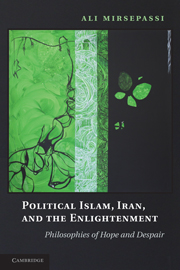Book contents
- Frontmatter
- Contents
- Acknowledgments
- Introduction
- 1 Intellectuals and the Politics of Despair
- 2 The Crisis of the Nativist Imagination
- 3 Modernity beyond Nativism and Universalism
- 4 Heidegger and Iran
- 5 Democracy and Religion in the Thought of John Dewey
- 6 Enlightenment and Moral Politics
- 7 Conclusion
- Notes
- Index
1 - Intellectuals and the Politics of Despair
Published online by Cambridge University Press: 01 March 2011
- Frontmatter
- Contents
- Acknowledgments
- Introduction
- 1 Intellectuals and the Politics of Despair
- 2 The Crisis of the Nativist Imagination
- 3 Modernity beyond Nativism and Universalism
- 4 Heidegger and Iran
- 5 Democracy and Religion in the Thought of John Dewey
- 6 Enlightenment and Moral Politics
- 7 Conclusion
- Notes
- Index
Summary
Intellectual work and ideas exist in a complex relation with the material and practical world, being neither the pure products of the individual mind (or “genius”) nor simply the passive reflections of material and economic reality in a given time and place. Although intellectual works and ideas are shaped by the institutions and material conditions in which they are born, they also have a measure of autonomy in their ongoing dialogue with historical intellectuals across the seas of time, and among specific contemporary intellectuals from near or far. In the dialectic between structure and agency, moreover, the modality of culture is a dualistic combination of constraints and enabling functions involving an ongoing negotiation of norms. These overall destabilizing and patterned “long” moments, involving the living and the dead, may be called intellectual communities. They form the material and imaginative source and space for the development of intellectual ideas on the conscious surface level of what is said, and the more buried unconscious level of a historical field of possible questions, outlooks, alternatives, and lines of formation. On this basis, it becomes important to explore and understand how intellectuals relate to and are influenced by other intellectuals, the way in which they imagine their own role and identity within the larger intellectual community and its history, and the often unconscious regularities that guide their thought.
- Type
- Chapter
- Information
- Political Islam, Iran, and the EnlightenmentPhilosophies of Hope and Despair, pp. 21 - 43Publisher: Cambridge University PressPrint publication year: 2010

